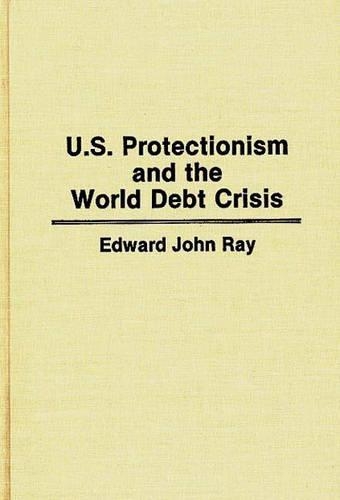
U.S. Protectionism and the World Debt Crisis
(Hardback)
Publishing Details
U.S. Protectionism and the World Debt Crisis
By (Author) Edward Ray
Bloomsbury Publishing PLC
Praeger Publishers Inc
11th December 1989
United States
Classifications
Tertiary Education
Non Fiction
Monetary economics
International relations
337.7301724
Physical Properties
Hardback
259
Description
This book presents a comprehensive review of US trade policy since World War II, with particular emphasis on how that policy has affected developing countries. Special attention is given to trade policy shifts in the last twenty years in an attempt to determine whether or not US trade concessions to developing countries contribute positively to their efforts to meet their considerable debt obligations. The author combines theoretical discussion with empirical data drawn from the seven leading debtor nations - Argentina, Brazil, Indonesia, Korea, Mexico, the Philippines, and Venezuela - in a provocative examination of the economic and socio-political causes and implications of changes in protectionism and the pattern of tariff and non-tarrif trade barriers in the last few decades. Following an introductory analysis of the history of protectionism in the United States, Ray explores the role of the General Agreement on Tariffs and Trade (GATT) after World War II in eliminating protection and the impact on developing countries of the changes in tariffs and in the use of non-tariff trade barriers under the auspices of GATT. Subsequent chapters deal with such issues as the reasons for the adoption of the Generalized System of Preferences (GSP) adopted in 1975, the relationship between US trade policies since 1975 and the world debt crisis, the reasons behind the adoption of the Caribbean Basin Initiative in 1983, and the 1985 revision of the GSP. A separate empirical chapter assesses the effects of the new GSP legislation on exports to the United States from developing countries in general and from the severely indebted seven in particular.
Reviews
"In this perceptive and stimulating book, Ed Ray utilizes a political economy framework to provide new insights on how and why recent U.S. trade policies have not been very helpful to the developing countries in dealing with their debt and development problems."-Robert Baldwin Profesor of Economics University of Wisconsin
This book gives a comprehensive review of U.S. trade policy since WWII. It seeks to determine whether or not U.S. trade concessions to developing countries have contributed positively to their efforts to meet their debt obligations. The author concludes that U.S. legislation embodying the U.S. Generalized System of Preferences which was supposed to improve access for developing countries to U.S. markets may, in fact, have been counterproductive.-Booknotes
This volume traces U.S. trade policy in the post-World War II period, emphasizing the impact of this policy on developing nations. Analysis includes empirical evidence on the ramifications of preferential trade agreements for the seven leading debtor nations (Argentina, Brazil, Idonesia, Korea, Mexico, Philippines, and Venezuela) as well as discussions pertaining to the developing world in general. Looks specifically at such policies as post-Kennedy Round traffic cuts, the U.S. Generalized System of Preferences agreement, and the Caribbean Basin initiative.-Economic Books
"This book gives a comprehensive review of U.S. trade policy since WWII. It seeks to determine whether or not U.S. trade concessions to developing countries have contributed positively to their efforts to meet their debt obligations. The author concludes that U.S. legislation embodying the U.S. Generalized System of Preferences which was supposed to improve access for developing countries to U.S. markets may, in fact, have been counterproductive."-Booknotes
"This volume traces U.S. trade policy in the post-World War II period, emphasizing the impact of this policy on developing nations. Analysis includes empirical evidence on the ramifications of preferential trade agreements for the seven leading debtor nations (Argentina, Brazil, Idonesia, Korea, Mexico, Philippines, and Venezuela) as well as discussions pertaining to the developing world in general. Looks specifically at such policies as post-Kennedy Round traffic cuts, the U.S. Generalized System of Preferences agreement, and the Caribbean Basin initiative."-Economic Books
Author Bio
EDWARD JOHN RAY is Professor and Chairperson of the Department of Economics at Ohio State University. Ray is co-authoring a book on the history of financing of the federal government in the United States as well as revising a principles text. He has had research support from the Department of Labor, Department of Commerce, USAID, and the Office of Technology Assessment. Ray's research has been published in a number of leading economics journals including the American Economic Review, Journal of Political Economy, and the Quarterly Journal of Economics.
